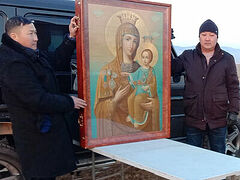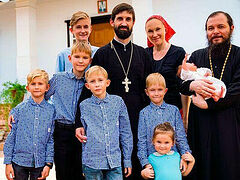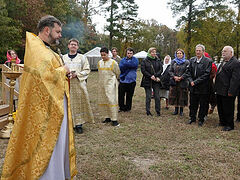He began in the church choir, he unexpectedly became a priest, and then quite suddenly ended up in Mongolia. May in Ulaanbaatar met Fr. Anthony with a terrible frost, but he came to love the new place of his ministry with all his heart. We spoke with Fr. Anthony, the rector of Holy Trinity Church in Ulaanbaatar about Mongolian tranquility and the wonders of conversion, the gym as a missionary tool, friendship with lamas, tips on combating internet addiction, and the beauty of the Gobi Desert.
 —Father, let’s start from the very beginning: How did you come to the faith?
—Father, let’s start from the very beginning: How did you come to the faith?
—I came to the faith through music. When I was a child, I suddenly had the completely spontaneous desire to go to church. I asked my mother: “Why don’t we go to church?” I had a vivid memory of being in church in my mother’s arms, apparently during a great feast. This image gave me no rest, and when I asked my mother this question, she answered: “If you want to, go.” After school in the evening, I went to the cathedral in Orenburg, and I stood there praying (or perhaps not praying, but just looking—it was very interesting). Some babushkas came over and told me there was a Sunday School, and I started going.
When I became a teenager, I abandoned the Church. But the warm memories of the atmosphere of love that reigned in the Sunday School, and the Christian spirit, remained. A few years later, when I was in my second year in music school, I was offered a job—singing in the choir in the church at the oncology hospital in Orenburg. I have to say that this “work,” my new ministry, started to change me. And the rector, Fr. Nikolai, suggested that I go to seminary. I answered him then: “Thank God they let me into the church, but seminary is definitely not for me.” Nevertheless, I stayed at the church and continued singing.
—But how did you decide to become a priest then, if you had such categorical doubts in the very beginning?
—I still didn’t want to become a priest. I had some “proud modesty.” When I finished music school, I started doing industrial and civil engineering distance courses at Orenburg University. And that same year, they opened the Orenburg Seminary. By that time, I’d already started singing in the choir in another church—Holy Protection—in the city. It’s rector, Fr. Leonid Antipov, now the Bishop of Buzuluk, persuaded me to go to seminary. So I started and studied full-time for a year. But in the end, I quit.
Then I went to sing in a third church, and it was there that the Lord led me to the priestly ministry. I was studying at the institute and working in my field at the same time, and everything in life was pretty good… But somehow I found myself in church from morning till evening. In the morning I would go to sing, and after the service I would stay to help the caretaker. In the evening I would sing and only then go home. And then, the rector of the Church of St. John the Theologian, where I was serving, literally pressed me: I needed to be ordained.
And I thought: If the Lord called me to this church, where I stay from morning till night, then probably I do need to do it. Of course, I resisted for some time, I didn’t want to, but in the end I agreed.
—And thus began your priestly path to Orenburg…
—Exactly.
—But then the question arises: How did you end up in Mongolia?
—Probably the same way I became a priest. I wasn’t planning to go anywhere. I served in the cathedral for four and a half years, then for the same amount of time I was the rector of three churches outside Orenburg at the same time. Then I was transferred to the cathedral again. And there, one day, my friend, as if he just happened to run into me, said: “Listen, they’re looking for a priest in Mongolia. Will you go?” I agreed literally within five minutes. I texted my wife: “We’re going to Ulaanbaatar.” And we’ve been here in Ulaanbaatar since 2019.
 —What was your first impression? Perhaps you had some culture shock?
—What was your first impression? Perhaps you had some culture shock?
—This was actually my first trip abroad. I didn’t even have a passport. When we were leaving Orenburg, we watched a bunch of videos from travel bloggers. My older daughter literally wept: “Papa, I don’t want to go there!” But papa was unyielding.
I was figuring that the climate in Orenburg is sharply continental, and in Mongolia the same. I didn’t expect any problems adapting, but how wrong I was! We landed in Ulaanbaatar on May 11. At home it was 95 degrees fahrenheit. Then we got on the plane and the pilot announced: The weather in Ulaanbaatar is sunny, 12 degrees… I was worried, because I only had a light windbreaker for me, and I put on everything I had on the plane, just so I wouldn’t freeze. The next shock came about four hours later, when it was already 60 degrees… So we had this climactic shock.
Another thing that caught my eye, or rather, my nose, was the smell of smoke and burning. It permeated everything you touched. There are 1.5 million people in Ulaanbaatar, and about half of them live in yurts, which are heated with coal.
As for people… You know, I’m learning patience from the Mongols. They’re very patient and, slow to anger, very calm. For example, this is obvious on the road. You can easily imagine how our drivers drive and swear if some little thing goes wrong. They might even get out to fight. In Mongolia, the roads are full of chaos: wall-to-wall traffic, traffic lights, no one follows any rules. But at the same time, no one fights with anyone! Even if you break the law, or take a long time to make some turn, they calmly wait for you—no one even honks.
The people are very benevolent. They love the Russians in Mongolia, although the situation is changing now (propaganda is working now, including Western propaganda). At first, it even happened that taxi drivers didn’t take any money from me. They said: “You’re Russian. We love you and remember Khalkhin-Gol,1 so no fare is necessary.”
—Do you like living in Mongolia?
—Let’s start with what I don’t like. It can be pretty cold. One year it was -60.
in the suburbs. Because of the traffic, I have to walk a lot. And it’s literally freezing, because for several weeks in a row it can be -22 during the day and -35 at night. You get tired of it. Plus the smoke and the terrible traffic. A distance that takes us ten minutes in Russia takes much longer in Mongolia. Once I stood in traffic for five hours, and that whole time went only two miles. I didn’t make it to where I was going. I parked the car and went on foot. Mongolia is very uncomfortable in this sense.
What I like is the internal freedom of the Mongols themselves. They’re open, not constricted. They can energize you.
—How do you communicate with the locals? Have you learned the language?
—Some Mongols speak Russian pretty well, so I haven’t forced myself to learn the language, but I do still speak Mongolian a little bit. It’s enough to figure out everyday issues. We also communicate in English. But there’s a problem in the parish: There are Mongols who speak neither English nor Russian. Sometimes Confession is a little problematic. But here too we find ways out of the situation.
—How old is the history of Orthodoxy in Mongolia?
—We can consider 1864 the starting point. A Russian consulate was opened in Ulaanbaatar in 1862, and they opened a church there where the first Liturgy was served two years later, on March 22. So, that’s more than 150 years. The parish here existed until 1927. In 1921, Fr. Theodore Parnikov was murdered by Baron Ungern.2 After that, priests from Buryatia and Irkutsk came to serve in the parish. Starting in 1927, there was a long period without any priests. Then in 1990, they again started taking care of the Mongol community—that’s what I would call it—and priests from Irkutsk and Ulan-Ude started coming. And in 1996, a local Russian community petitioned the Patriarch to send a priest to Ulaanbaatar. The services were resumed on a permanent basis in 1997.
The trade representation of Russia was given a two-story building to use as a parish, and on the second floor they made a church. They opened a trapeza, a Sunday School, and art clubs.
 Church of the Life-giving Trinity, Ulaanbaatar
Church of the Life-giving Trinity, Ulaanbaatar
—Did I understand correctly that there’s just one parish in Mongolia now?
—Yes, the only one is in Ulaanbaatar. There used to be a prayer room in the city of Erdenet, where there was a large number of Russian employees at the mining complex. In the end, the room was closed a few years ago because our compatriots left. And it just didn’t work out to gather too many Mongols.
—Are there representatives of other Orthodox jurisdictions in Mongolia?
—No, only the Russian Orthodox Church. Mongolia is considered the canonical territory of the ROC-Moscow Patriarchate. One of the flags in the Patriarch’s office is the Mongolian flag.
—Is the community large today? Is it made up of Russians, or are there representatives of other nationalities?
—We have about 150–200 regular parishioners. On average, there are about 30–70 people at a service. The majority are Russian citizens who came to work in Mongolia: school teachers, diplomatic staff… There are quite a lot of Russians permanently residing in Mongolia. There are also Greeks, Serbs, Moldovans, one Orthodox Canadian, and there was an American recently (he has a Russian wife). Of course, there are also Mongols—about ten come regularly. I think that’s everyone.
—You stipulated that besides those Russians who came to work, there are also those who “are permanently residing in Mongolia.” Who are they?
—I have two friends who married Mongols. They came to work as teachers, they met their future spouses, they got married, and they stayed. There are descendants of the white emigration who came both before and after the revolution. There are people who have remained since the time when the Soviet army was on Mongolian territory. I even know one man who’s been living here undocumented for many, many years… The Soviet army left, but he stayed; he never returned to his homeland.
—Please tell us about the most striking case of a conversion of a local to Orthodoxy.
—It was in 2019, when I had just come to Ulaanbaatar. One morning I went to church and I saw an old Mongol in folk clothes sprawled out on the floor at the entrance to the church. At first I thought maybe he’s drunk. I looked closely—he seemed normal. I didn’t touch him, I just went around. The parishioners told me he was one of ours. Then they told me this man used to be a crook (literally), but he repented and turned to Christ and became a parishioner. He lives somewhere a good way from Ulaanbaatar. After his repentance and Baptism, he worked at the dirtiest job. He literally crawled into the church, considering himself unworthy. Then he came to me for Confession. That was one of the most striking cases.
Another story: There’s one Mongol family, a father and son, that comes to church. The father came one day and said his son wants to be baptized. I agreed, of course, but I asked: Don’t you yourself want to become Orthodox? He said he didn’t particularly want to, but his son (Sundar) wanted to; he doesn’t speak Russian, so he sent his father. Sundar spent a long time going through catechesis, and after a few months, we baptized him and he became a parishioner. In the end, the father came too—“I also want to be baptized.” He started coming to the services together with his son. And so our parish was replenished with such faithful Mongols. The grace of the Holy Spirit touched their hearts.
—Amazing.
—Moreover, it’s completely unclear what moved these people… Although they had a Russian grandmother or great-grandmother. Look how a grandmother’s preaching impacts the next generations! They remembered that grandma prayed; the memory remained and later touched their hearts. As in my case: I remembered how my mother took me to church, and then I consciously came to the Church. This family is now facing condemnation from their relatives.
To be continued…






